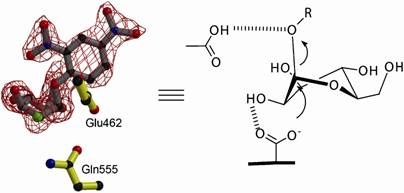Virtual human in HIV drug simulation
The combined supercomputing power of the UK and US 'national grids' has enabled UCL (University College London) scientists to simulate the efficacy of an HIV drug in blocking a key protein used by the lethal virus. The method - an early example of the Virtual Physiological Human in action - could one day be used to tailor personal drug treatments, for example for HIV patients developing resistance to their drugs.
The study, published in the Journal of the American Chemical Society, ran a large number of simulations to predict how strongly the drug saquinavir would bind to three resistant mutants of HIV-1 protease, a protein produced by the virus to propagate itself. These protease mutations are associated with the disease's resistance to saquinavir, an HIV-inhibitor drug.
The study, by Professor Peter Coveney and colleagues at the UCL Department of Chemistry, involved a sequence of simulation steps, performed across several supercomputers on the UK's National Grid Service and the US TeraGrid, which took two weeks and used computational power roughly equivalent to that needed to perform a long-range weather forecast.
The idea behind the Virtual Physiological Human (VPH) is to link networks of computers across the world to simulate the internal workings of the human body. The VPH - mainly a research initiative at present - allows scientists to simulate the effects of a drug and see what is happening at the organ, tissue, cell and molecular level.
Although nine drugs are currently available to inhibit HIV-1 protease, doctors have no way of matching a drug to the unique profile of the virus as it mutates in each patient. Instead, they prescribe a course of drugs and then test whether these are working by analysing the patient's immune response. One of the goals of VPH is for such 'trial and error' methods to eventually be replaced by patient-specific treatments tailored to a person's unique genotype.
Professor Peter Coveney says: "This study represents a first step towards the ultimate goal of 'on-demand' medical computing, where doctors could one day 'borrow' supercomputing time from the national grid to make critical decisions on life-saving treatments.
Original publication: Ileana Stoica, S. Kashif Sadiq, and Peter V. Coveney; "Rapid and Accurate Prediction of Binding Free Energies for Saquinavir-Bound HIV-1 Proteases"; Journal of the American Chemical Society 2008.
Most read news
Topics
Organizations
Other news from the department science

Get the analytics and lab tech industry in your inbox
By submitting this form you agree that LUMITOS AG will send you the newsletter(s) selected above by email. Your data will not be passed on to third parties. Your data will be stored and processed in accordance with our data protection regulations. LUMITOS may contact you by email for the purpose of advertising or market and opinion surveys. You can revoke your consent at any time without giving reasons to LUMITOS AG, Ernst-Augustin-Str. 2, 12489 Berlin, Germany or by e-mail at revoke@lumitos.com with effect for the future. In addition, each email contains a link to unsubscribe from the corresponding newsletter.






















































